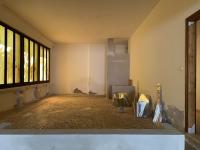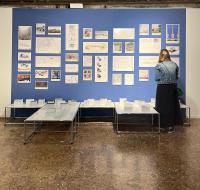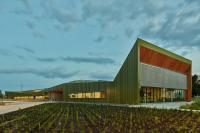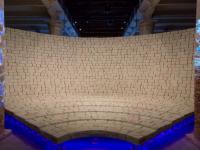Studio and Family House
China
This building base features: an area of nearly 200 acres, 50 meters long from east to west, 25 meters long from south to north. The base from the east side is 6 meters above the water. North and south sides of the building are adjacent to other studios, on the west side is the village-level road. 100s-1 studio was built in 2011, with an area of 309 square meters, a quarter of the total area of the base.
The door of studio opened on the west side of the village-level road. Five tier courtyards from west to east formed the space, and continuously with ups and downs to the pond. First tier is a small yard after entering the main door, it is slightly above the pavement. It is a buffer space connects parking lot, warehouse, boiler room. A shadow wall in front of the small courtyard blocks people's view to the secondary courtyard. The secondary tier can be entered through stairs on the north side or a gentle slope on the south side. It creates an open space with blooming garden and seven graceful fruit trees.
Through fruit trees, the third tier yard can be seen indistinctly. In order to highlight the open courtyard, the building volume above the ground has been reduced, the rest part of building has been hidden in the underground. The part above ground is 25 meters wide, 6.9 meters with depth and 3 meters ceiling height. Overhangs of roof and ground form two parallel lines with three sides floor-to-ceiling glass, reflects the nature as part of the corridor. Looking to east in side of the building, there is a panoramic view of the entire surface of the water.
The fourth and the fifth tier of space are private space, they are hidden behind the garden with 3.9 meters sinking to the pond. Private living area can only be entered through stairs within studio, this "inconvenient" design separates the publicity of studio and privacy of living space. By stairs, space of studio has been extended to the underground, which is a living space. From this point, small independent "unit" space as small "cells" of space have been interlinked.
Different combinations of small "cells" create open and close formation of a great variety of pond and a small courtyards, meanwhile keep direct access to outdoor space. "In addition to the relationship between the volume, there are relationship between the house and the yard, the relationship between space and furniture, space and plants, the studio and living space and of course, relationships between people and the house. The relationship brings rich experience and change. The house express the best way of spatial relationships without boundaries. "











